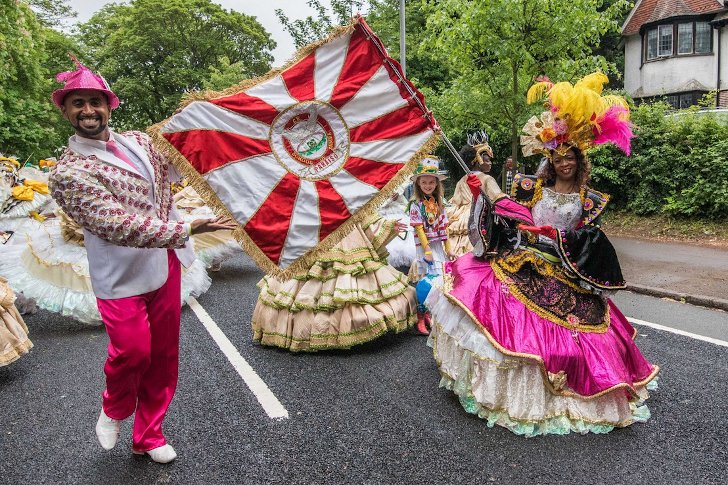The history of festive street processions in Luton can be traced to Guild Feasts that began in the late 15th century. Other festivities that may have somewhat inspired the present-day carnival include the 1896 opening of the Plait Halls, the 1935 King George V Silver Jubilee, WWII carnivals and parades that were held to raise money for the war effort, the 1945 Victory in Europe Day, St George’s Day parades that started in the 1950s, and the 1953 Easter Bonnet Parade.
The Luton International Carnival as we know it started in 1976, when the Luton Borough Council organized a Victorian Street Fair and Charity Market for its centenary celebrations. The event evolved over the years, with the fair element declining and the focus shifting toward the carnival procession. It eventually acquired international status in 1998 and became one of the most vibrant Caribbean carnivals in the United Kingdom.
Until 2012, the carnival was held on the Spring Bank Holiday Monday, except for 2000, when the carnival was expanded to three days to mark the beginning of the new millennium. The 2012 carnival was pushed to a later date in July to coincide with the arrival of the London 2012 Olympic Torch and other festive events that were held in Luton during that time. Starting in 2013, the carnival was moved to the Sunday of the Spring Bank Holiday weekend.
The Luton International Carnival is organized by UK Centre for Carnival Arts (UKCCA), a dedicated organization opened in 2009 to promote excellence within carnival arts in all forms (mas bands, steel orchestras, calypso and soca music, samba, floats, and more) and support the cultural and artistic sector in Luton and the surrounding areas.
The main event of the Luton International Carnival is, of course, the parade that makes its way through Luton Town Center. The bright and vibrant procession includes carnival groups, music bands, clubs, schools, community organizations, businesses, and groups of friends and family, all dressed in elaborate costumes. Carnival entries may take different forms: lavishly decorated floats, mas bands, marching bands, live music bands, walking troupes, or a combination.
Besides the parade, the program of the Luton International Carnival includes many other exciting events and activities for the entire family such as storytelling sessions, performances, arts and crafts, a community program of young up and coming performing artists, and more. And of course there are vendors from Luton and the surrounding areas selling souvenirs and delicious foods.
Throughout its history, the Luton International Carnival has been canceled three times so far: in 2007 due to unforeseen major flooding caused by heavy rain, and in 2020 and 2021 due to the COVID-19 pandemic.

Photo: carnivalarts.org.uk




